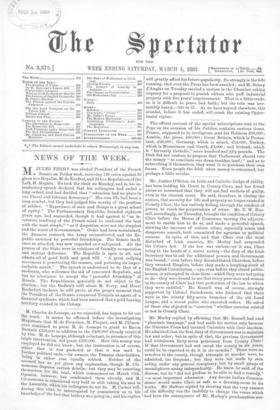Mr. Justice O'Brien, an Irish and Catholic Judge of ability,
has been holding his Court in County Clare, and has found juries so terrorised that they will not find verdicts of guilty, even in the clearest cases. He said, therefore, in closing the assizes, that security for life and property no longer existed in County Clare, the law entirely failing, through the conduct of jurors, to reach the perpetrators of crime. Mr. T. W. Rus- sell, accordingly, on Thursday, brought the condition of County Clare before the House of Commons, moving the adjourn- ment to enable him to do so, and made a powerful speech, showing the increase of serious crime, especially arson and dangerous assault, both committed for agrarian or political reasons. In spite of this, and that Clare was the most disturbed of Irish counties, Mr. Morley had suspended the Crimes Act. If the law was useless—as it was, Clare being in the hands of a secret society—the duty of the Irish Secretary was to ask for additional powers, and Government was bound, "even before they disestablished Churches, before they wrecked Empires, before they made a laughing-stook of the English Constitution,— aye, even before they closed public. houses, or attempted to close them—which they were not going to do—they were bound to see that every poor man and woman in the county of Clare had that protection of the law to which they were entitled." Mr. Russell was, of course, strongly supported by Colonel Saunderson, who declared that there were in the county fifty-seven branches of the old Land League, and a secret police who executed orders. He asked of those who objected to " coercion " whether coercion existed or not in County Clare.






































